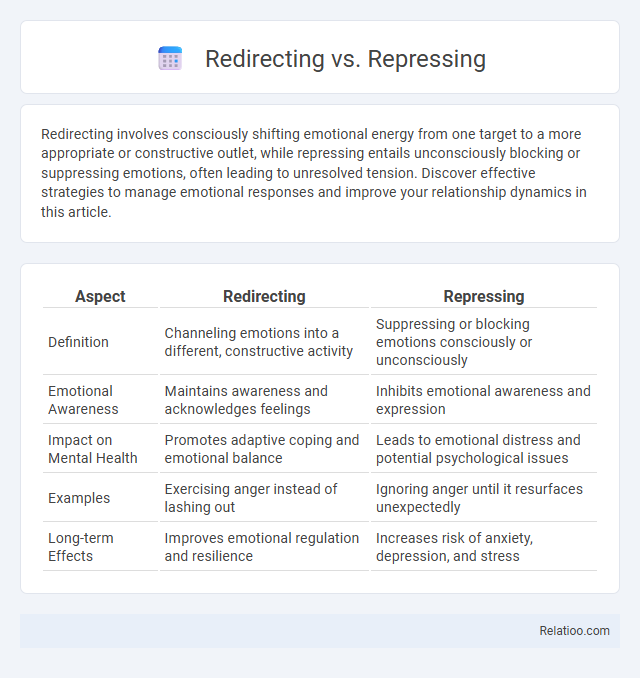Redirecting involves consciously shifting emotional energy from one target to a more appropriate or constructive outlet, while repressing entails unconsciously blocking or suppressing emotions, often leading to unresolved tension. Discover effective strategies to manage emotional responses and improve your relationship dynamics in this article.
Table of Comparison
| Aspect | Redirecting | Repressing |
|---|---|---|
| Definition | Channeling emotions into a different, constructive activity | Suppressing or blocking emotions consciously or unconsciously |
| Emotional Awareness | Maintains awareness and acknowledges feelings | Inhibits emotional awareness and expression |
| Impact on Mental Health | Promotes adaptive coping and emotional balance | Leads to emotional distress and potential psychological issues |
| Examples | Exercising anger instead of lashing out | Ignoring anger until it resurfaces unexpectedly |
| Long-term Effects | Improves emotional regulation and resilience | Increases risk of anxiety, depression, and stress |
Understanding Redirecting vs Repressing
Redirecting involves consciously shifting your emotions or impulses toward a more constructive outlet, while repressing means unconsciously suppressing feelings, which can lead to unresolved emotional tension. You can manage stress more effectively by recognizing when to redirect negative energy instead of repressing it, enabling healthier emotional processing. Understanding these differences helps promote emotional resilience and supports mental well-being.
The Psychology Behind Redirecting
The psychology behind redirecting involves consciously shifting your emotional or behavioral response from a negative or unproductive action to a more positive or constructive one, promoting healthier coping mechanisms. Unlike repressing, which keeps unwanted thoughts or feelings buried and often causes internal tension, redirecting allows Your mind to process emotions in a controlled way, reducing psychological distress. Redirecting helps in managing impulses by consciously channeling energy toward beneficial activities, enhancing emotional regulation and overall mental well-being.
The Consequences of Repressing
Repressing emotions often leads to increased psychological stress, manifesting as anxiety, depression, or physical health issues such as hypertension. Unlike redirecting, which channels feelings into constructive actions, repression suppresses the root cause, causing unresolved tension and potential breakdowns in relationships. Neuroscience research links chronic repression to altered brain function in the amygdala and prefrontal cortex, which impairs emotional regulation and decision-making.
Key Differences Between Redirecting and Repressing
Redirecting involves consciously shifting your focus or actions from one thought or behavior to a more positive or productive one, while repressing means unconsciously blocking out unwanted thoughts or feelings from your awareness. Redirecting is an active coping strategy that can empower you to manage stress or negative emotions effectively, whereas repressing tends to bury these emotions, potentially causing psychological strain over time. Understanding these key differences helps improve your emotional regulation and mental well-being through deliberate mindset adjustments rather than avoidance.
Emotional Health: Benefits of Redirecting
Redirecting emotional energy involves consciously shifting your feelings from negative thoughts to constructive actions, promoting emotional resilience and mental clarity. Unlike repressing, which buries emotions and can lead to increased stress or anxiety, redirecting encourages healthy expression and problem-solving. Your emotional health benefits from this approach by reducing internal conflict and fostering adaptive coping mechanisms.
How Repressing Affects Mental Well-being
Repressing emotions involves unconsciously blocking distressing feelings, which can lead to increased stress, anxiety, and a buildup of unresolved psychological tension. Unlike redirecting, which channels emotions into healthier outlets or behaviors, repressing prevents emotional processing, often resulting in diminished mental well-being and potential development of mental health disorders. Studies show that long-term repression is linked to symptoms such as depression, elevated cortisol levels, and impaired emotional regulation.
Effective Strategies for Redirecting Emotions
Effective strategies for redirecting emotions involve consciously shifting focus from negative feelings to positive or constructive activities, such as engaging in hobbies, physical exercise, or creative expression. Unlike repressing, which suppresses emotions and can lead to unresolved psychological tension, redirecting allows for emotional release and adaptation without denial. By acknowledging emotions and channeling their energy into alternative outlets, individuals enhance emotional regulation and reduce stress.
Signs You Might Be Repressing Feelings
Repressing feelings often manifests as unexplained irritability, persistent anxiety, or physical symptoms like headaches and stomachaches, signaling that emotional stress is buried rather than addressed. You might notice difficulty recalling certain events or emotions tied to trauma, indicating your mind is actively pushing these feelings out of conscious awareness. Recognizing these signs is crucial to fostering emotional health and developing effective coping strategies.
Redirecting vs Repressing in Everyday Life
Redirecting involves consciously changing your focus or actions toward a more positive or productive outlet, helping to manage emotions without suppression. Repressing, on the other hand, pushes unwanted feelings or thoughts out of conscious awareness, which can lead to unresolved stress or emotional buildup. Understanding when to redirect your energy instead of repressing emotions is key to healthier emotional regulation and overall well-being in everyday life.
Choosing the Right Approach for Emotional Management
Choosing the right approach for emotional management depends on understanding the subtle differences between redirecting, repressing, and suppressing emotions. Redirecting involves consciously channeling emotional energy into positive activities, promoting healthy expression, while repressing is an unconscious process that buries emotions, often leading to unresolved psychological stress and anxiety. Suppressing entails a deliberate effort to inhibit emotional responses temporarily, which may be useful short-term but can cause emotional buildup if overused, making redirecting the most sustainable strategy for long-term emotional well-being.

Infographic: Redirecting vs Repressing
 relatioo.com
relatioo.com